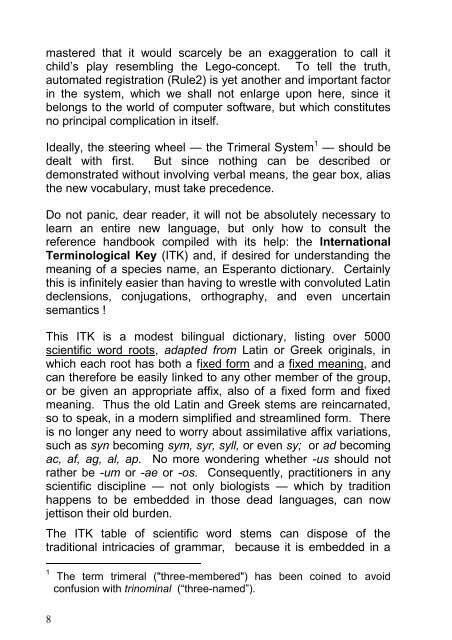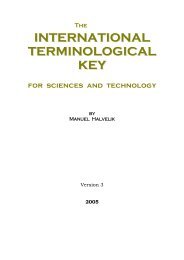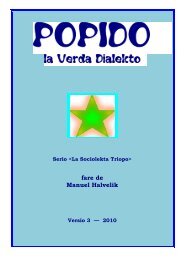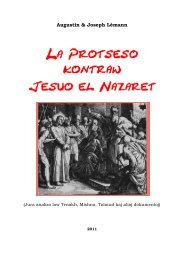the TRIMERAL SYSTEM in BIOLOGICAL TAXONOMY - universala ...
the TRIMERAL SYSTEM in BIOLOGICAL TAXONOMY - universala ...
the TRIMERAL SYSTEM in BIOLOGICAL TAXONOMY - universala ...
Create successful ePaper yourself
Turn your PDF publications into a flip-book with our unique Google optimized e-Paper software.
mastered that it would scarcely be an exaggeration to call it<br />
child’s play resembl<strong>in</strong>g <strong>the</strong> Lego-concept. To tell <strong>the</strong> truth,<br />
automated registration (Rule2) is yet ano<strong>the</strong>r and important factor<br />
<strong>in</strong> <strong>the</strong> system, which we shall not enlarge upon here, s<strong>in</strong>ce it<br />
belongs to <strong>the</strong> world of computer software, but which constitutes<br />
no pr<strong>in</strong>cipal complication <strong>in</strong> itself.<br />
Ideally, <strong>the</strong> steer<strong>in</strong>g wheel — <strong>the</strong> Trimeral System 1 — should be<br />
dealt with first. But s<strong>in</strong>ce noth<strong>in</strong>g can be described or<br />
demonstrated without <strong>in</strong>volv<strong>in</strong>g verbal means, <strong>the</strong> gear box, alias<br />
<strong>the</strong> new vocabulary, must take precedence.<br />
Do not panic, dear reader, it will not be absolutely necessary to<br />
learn an entire new language, but only how to consult <strong>the</strong><br />
reference handbook compiled with its help: <strong>the</strong> International<br />
Term<strong>in</strong>ological Key (ITK) and, if desired for understand<strong>in</strong>g <strong>the</strong><br />
mean<strong>in</strong>g of a species name, an Esperanto dictionary. Certa<strong>in</strong>ly<br />
this is <strong>in</strong>f<strong>in</strong>itely easier than hav<strong>in</strong>g to wrestle with convoluted Lat<strong>in</strong><br />
declensions, conjugations, orthography, and even uncerta<strong>in</strong><br />
semantics !<br />
This ITK is a modest bil<strong>in</strong>gual dictionary, list<strong>in</strong>g over 5000<br />
scientific word roots, adapted from Lat<strong>in</strong> or Greek orig<strong>in</strong>als, <strong>in</strong><br />
which each root has both a fixed form and a fixed mean<strong>in</strong>g, and<br />
can <strong>the</strong>refore be easily l<strong>in</strong>ked to any o<strong>the</strong>r member of <strong>the</strong> group,<br />
or be given an appropriate affix, also of a fixed form and fixed<br />
mean<strong>in</strong>g. Thus <strong>the</strong> old Lat<strong>in</strong> and Greek stems are re<strong>in</strong>carnated,<br />
so to speak, <strong>in</strong> a modern simplified and streaml<strong>in</strong>ed form. There<br />
is no longer any need to worry about assimilative affix variations,<br />
such as syn becom<strong>in</strong>g sym, syr, syll, or even sy; or ad becom<strong>in</strong>g<br />
ac, af, ag, al, ap. No more wonder<strong>in</strong>g whe<strong>the</strong>r -us should not<br />
ra<strong>the</strong>r be -um or -ae or -os. Consequently, practitioners <strong>in</strong> any<br />
scientific discipl<strong>in</strong>e — not only biologists — which by tradition<br />
happens to be embedded <strong>in</strong> those dead languages, can now<br />
jettison <strong>the</strong>ir old burden.<br />
The ITK table of scientific word stems can dispose of <strong>the</strong><br />
traditional <strong>in</strong>tricacies of grammar, because it is embedded <strong>in</strong> a<br />
1 The term trimeral ("three-membered") has been co<strong>in</strong>ed to avoid<br />
confusion with tr<strong>in</strong>om<strong>in</strong>al (“three-named”).<br />
8






